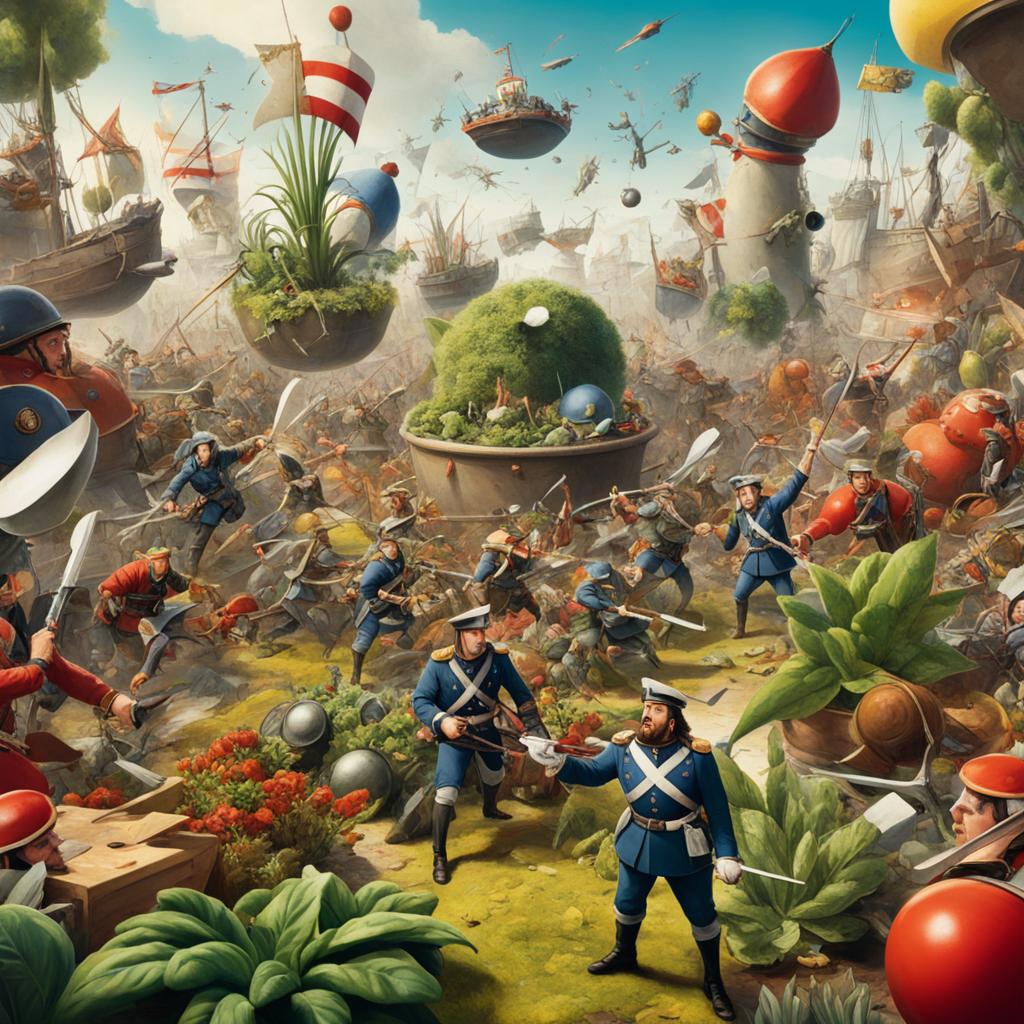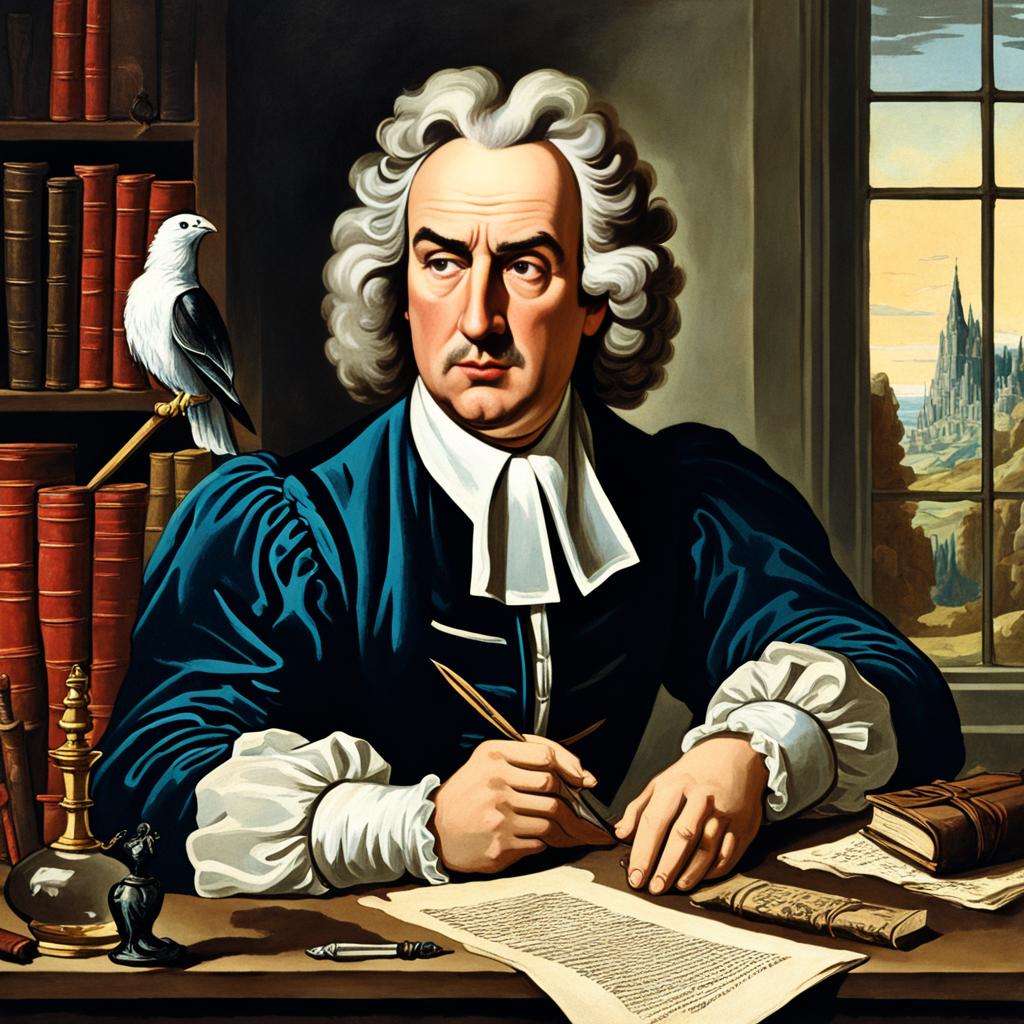Jonathan Swift’s masterpiece, Gulliver’s Travels, is much more than a whimsical adventure story. It delves deep into the complexities of society, offering profound moral lessons that resonate even in today’s world. From the dangers of pride to the absurdity of war, Gulliver’s Travels challenges our beliefs and prompts us to reflect on our own actions and values.
But what exactly is the moral lesson of this iconic novel? What timeless wisdom does it hold for us today? Let’s explore the relevance of Gulliver’s Travels and uncover the profound insights hidden within its pages.
Join us on a journey through the captivating world of Gulliver’s Travels as we unravel the moral lessons that have stood the test of time. Discover how stepping out of your comfort zone, embracing lifelong learning, and questioning the absurdities of our society can lead to personal growth and a deeper understanding of the world around us.
Lessons from Gulliver’s Travels: Getting Out of Your Comfort Zone

One of the primary moral lessons in Gulliver’s Travels is the importance of getting out of your comfort zone. Throughout his travels, Gulliver encounters unfamiliar situations, diverse beliefs, customs, and different perspectives from the societies he visits. By immersing himself in these new experiences, Gulliver gains invaluable life lessons about empathy, understanding, and personal growth.
Stepping out of your comfort zone allows you to broaden your horizons and discover new aspects of yourself. It pushes you to challenge preconceived notions, expand your worldview, and foster personal development. When you embrace discomfort and push beyond your limits, you open yourself up to valuable opportunities for learning and self-discovery.
By exploring new environments and interacting with people from different backgrounds, you develop empathy and a deeper understanding of others. This exposure to diverse perspectives helps you break down stereotypes, challenge biases, and cultivate a more inclusive mindset. Additionally, being open to different experiences fosters adaptability and resilience, as you learn to navigate unfamiliar situations and adapt to changing circumstances.
When you venture beyond your comfort zone, you also gain a greater appreciation for the interconnectedness of the world. Gulliver’s encounters with different societies in Gulliver’s Travels highlight the interplay between culture, beliefs, and human experiences. Similarly, embracing new experiences and interacting with diverse individuals allows you to recognize the shared humanity that unites us all.
Getting out of your comfort zone can manifest in various ways, such as traveling to new destinations, trying new activities, or engaging in conversations with people who hold different perspectives. Each step outside of your comfort zone presents an opportunity for growth, self-discovery, and the acquisition of valuable life lessons.
Benefits of Getting Out of Your Comfort Zone:
- Personal Growth: Stepping out of your comfort zone promotes personal development and helps you discover new strengths and abilities.
- Expanded Perspective: Embracing new experiences broadens your worldview, challenges biases, and encourages a more inclusive mindset.
- Empathy and Understanding: Interacting with diverse individuals fosters empathy, understanding, and the ability to connect with others on a deeper level.
- Adaptability and Resilience: Venturing beyond your comfort zone builds adaptability and resilience as you navigate unfamiliar situations and overcome challenges.
- Shared Humanity: Exploring new environments highlights the interconnectedness of the world and fosters a sense of unity and shared experiences.
Getting out of your comfort zone may initially feel daunting, but the rewards of personal growth, expanded perspectives, and meaningful connections are invaluable. So take a leap of faith, embrace discomfort, and embark on your own transformative journey of self-discovery, just like Gulliver did in Gulliver’s Travels.
Lifelong Learning: A Lesson from Gulliver’s Travels
Gulliver’s Travels, apart from its satirical nature, also imparts an important lesson on the value of lifelong learning. Throughout his journey, Gulliver encounters diverse societies that challenge his preconceived notions and broaden his understanding of the world. He realizes that people often have a tendency to view the world through their own beliefs and experiences, seeking confirmation rather than truth. This phenomenon is known as confirmation bias, where individuals subconsciously seek information that aligns with their existing beliefs.
The novel invites readers to reflect on their own biases and encourages an open-minded approach, promoting the pursuit of truth and understanding. It emphasizes the importance of continual learning and the exploration of new perspectives, in order to break free from the limitations imposed by confirmation bias.
Gulliver’s encounters with different societies serve as a stark reminder that embracing diverse viewpoints and seeking new knowledge are essential in a rapidly changing world. By being receptive to unfamiliar ideas and challenging our own beliefs, we can foster personal growth and develop a more comprehensive understanding of the world around us.
As the table below illustrates, lifelong learning is an ongoing process that allows individuals to adapt to new challenges, broaden their horizons, and thrive in a dynamic world:
| Benefits of Lifelong Learning | Examples |
|---|---|
| Personal Growth | Acquiring new skills and knowledge outside of one’s comfort zone, such as learning a new language or instrument |
| Career Advancement | Continuously updating professional skills and staying abreast of industry trends to remain competitive in the job market |
| Enhanced Problem-Solving | Learning from different disciplines and perspectives to develop creative solutions to complex problems |
| Improved Relationships | Gaining understanding and empathy for others by exploring diverse cultures, histories, and perspectives |
| Mental Stimulation | Engaging in intellectual pursuits, such as reading, writing, or participating in thought-provoking discussions |
The Dangers of Pride: A Lesson from Gulliver’s Travels

In Gulliver’s Travels, pride is depicted as a dangerous trait that leads to Gulliver’s downfall. His increasing arrogance blinds him to the valuable lessons and wisdom offered by others. This moral lesson serves as a reminder of the importance of humility and the risks associated with ego-driven leadership.
Pride hinders personal and professional growth, as it prevents individuals from acknowledging their limitations and seeking alternative perspectives. Gulliver’s experience highlights the negative impact of pride on relationships and the inability to recognize the value of teamwork and collaboration.
To be an effective leader, it is essential to embrace humility and foster an environment where diverse voices are heard and respected. Humility allows leaders to acknowledge their own shortcomings and the contributions of others, leading to more informed decision-making and fostering a positive work culture.
Leaders who exhibit humility are more open to learning from others, recognizing that they do not have all the answers. This fosters continuous growth and development, both for themselves and their teams. By being humble, leaders inspire trust and create an environment where individuals feel valued and empowered.
Gulliver’s Travels serves as a reminder of the dangers of pride and underscores the importance of humility and self-awareness in leadership.
Questioning the Absurdity of War: Lessons from Gulliver’s Travels

Gulliver’s Travels, a masterpiece by Jonathan Swift, offers a scathing criticism of the absurdity of war as a method of conflict resolution. The novel ingeniously satirizes the futile and irrational nature of resorting to violence to settle disputes. An especially memorable scene showcases the war between the Lilliputians and Blefuscans, which is triggered by their disagreement on the correct way to crack an egg. This comically exaggerated war highlights the sheer pointlessness of engaging in violent conflicts over trivial matters.
In Gulliver’s Travels, Swift prompts readers to reflect on the true nature of war and question its efficacy in resolving conflicts. By portraying the warring nations as minuscule creatures fighting senselessly, the novel emphasizes the irrationality and destructive consequences of war. It challenges readers to consider alternative methods for conflict resolution that prioritize understanding, compassion, and open dialogue. Swift’s poignant critique of war remains just as relevant today as it was when the novel was first published in 1726.
| Key Points | Lessons from Gulliver’s Travels |
|---|---|
| The futility of war | Gulliver’s Travels highlights the pointless and absurd nature of engaging in violent conflicts over trivial matters. |
| Raising questions about violence | The novel prompts readers to question the true nature of war and prompts them to seek alternative, peaceful methods for resolving conflicts. |
| Prioritizing understanding and compassion | Gulliver’s Travels encourages readers to prioritize empathy, compassion, and open dialogue as more effective means of resolving conflicts. |
Power and its Effects on Society: Lessons from Gulliver’s Travels
In Jonathan Swift’s Gulliver’s Travels, the theme of power and its impact on society is intricately explored. The novel presents various societies with distinct power dynamics, shedding light on the ethical implications and potential abuses that can arise when power is concentrated in the hands of a select few.
Gulliver encounters societies such as the Lilliputians, where power is heavily centralized, and the giants of Brobdingnag, where his own relative size renders him powerless. These diverse depictions of power dynamics serve to emphasize the importance of balance and equity in the distribution of power.
For example, the intellectually-driven society of Laputa highlights the potential detachment from reality that can occur when power overcomes empathy. On the other hand, the rational horses of Houyhnhnms provide a contrasting view where power is guided by ethical leadership and empathy for others.
Gulliver’s experiences with these societies provoke readers to consider the societal impact of power dynamics and the potential consequences of concentrated power. The novel reinforces the notion that a just and stable society can only be maintained through a balance of power, empathy, and ethical leadership.
To further illustrate the power dynamics portrayed in Gulliver’s Travels, consider the following table:
| Society | Power Dynamics | Implications |
|---|---|---|
| Lilliputians | Centralized power hierarchy | Loss of individual freedom |
| Brobdingnag | Gulliver’s powerlessness as a giant | Perception of vulnerability and insignificance |
| Laputa | Intellectually-driven power detached from reality | Isolation, lack of connection with society |
| Houyhnhnms | Rational power guided by empathy and ethical leadership | Harmony, stability, and justice |
Through the exploration of power dynamics in Gulliver’s Travels, readers are encouraged to critically analyze the systems of power within their own societies. By considering the potential consequences of imbalanced power and the importance of empathetic and ethical leadership, individuals can strive to create a more just and equitable society.
The Body and the Mind: Lessons from Gulliver’s Travels
Gulliver’s Travels explores the intricate relationship between the body and the mind, challenging conventional notions of physical and moral power. In Jonathan Swift’s satirical novel, Gulliver encounters societies that prioritize either intellect or physicality, highlighting the shortcomings of each approach.
Through Gulliver’s encounters with the rational Houyhnhnms and the bestial Yahoos, readers are prompted to reconsider the traditional understanding of power and value. The novel suggests that true power and worthiness come from a harmonious balance between the mind and the body, emphasizing that moral superiority is not solely determined by physical attributes.
This exploration of the mind-body connection in Gulliver’s Travels encourages readers to reflect on their own perceptions of power and to recognize the value in both intellectual acuity and physical prowess. By challenging the dichotomy between the body and the mind, the novel provokes a broader understanding of power dynamics and the complexities of human worth.
Explore the concept of mind-body connection in Gulliver’s Travels further with the following table:
| Mind Characteristics | Body Characteristics |
|---|---|
| Rationality | Physical strength |
| Intellectual prowess | Moral integrity |
| Empathy | Physical health |
As demonstrated in the table above, Gulliver’s Travels portrays contrasting qualities associated with the mind and the body. However, the novel ultimately suggests that true power and moral superiority arise from the harmonious integration of both aspects.
The Timeless Relevance of Gulliver’s Travels
The moral lessons of Gulliver’s Travels continue to hold significant relevance in today’s society. Jonathan Swift’s masterful societal critique examines the norms, power dynamics, and human behaviors that shape our world, making it a thought-provoking read for contemporary readers.
In the fast-paced and complex modern world, Gulliver’s Travels invites you to reflect on your own beliefs and actions. It challenges you to consider how societal structures and personal biases influence your perspectives. By exploring different societies and their flaws, the novel teaches valuable lessons about empathy, humility, and the importance of an open mind.
As we navigate the complexities of today’s society, the timeless relevance of Gulliver’s Travels becomes evident. This literary masterpiece provides a lens through which we can examine our own society, critically analyzing the power dynamics, social norms, and human follies that still prevail. By engaging with the moral lessons of the book, we can better understand the shortcomings of our own world and strive for positive change.
FAQ
Q: What is the moral lesson of Gulliver’s Travels?
A: The novel offers several moral lessons, including the importance of stepping out of one’s comfort zone, the value of lifelong learning, the dangers of pride, the absurdity of war, and the impact of power on society and the individual.
Q: What is the lesson from Gulliver’s Travels about getting out of your comfort zone?
A: Gulliver’s Travels emphasizes the importance of getting out of one’s comfort zone and embracing new experiences and perspectives. By immersing oneself in unfamiliar situations, one can learn valuable lessons about empathy, understanding, and personal growth.
Q: What lesson does Gulliver’s Travels teach about lifelong learning?
A: Gulliver’s Travels highlights the value of lifelong learning and challenges the notion of confirmation bias. The novel encourages readers to be open-minded, seek new knowledge, and continuously question existing beliefs in order to gain a deeper understanding of the world.
Q: What moral lesson does Gulliver’s Travels teach about the dangers of pride?
A: Gulliver’s Travels portrays the negative impact of pride and arrogance through the downfall of its protagonist, Gulliver. The novel reminds readers of the importance of humility and the dangers of ego-driven leadership.
Q: What lesson does Gulliver’s Travels teach about the absurdity of war?
A: Gulliver’s Travels presents a powerful critique of war, highlighting its absurdity through satirical portrayals of conflicts in the book. The novel prompts readers to question the true nature of war and encourages alternative methods of conflict resolution that prioritize understanding, compassion, and dialogue.
Q: What lesson does Gulliver’s Travels teach about power and its effects on society?
A: Gulliver’s Travels explores the dynamics of power and its impact on society. The novel raises questions about the ethics of power and the potential abuses that arise from excessive control. It emphasizes the importance of balance, empathy, and ethical leadership in maintaining a just and stable society.
Q: What lesson does Gulliver’s Travels teach about the body and the mind?
A: Gulliver’s Travels challenges conventional notions of physical and moral power, highlighting the importance of a harmonious balance between the mind and the body. The novel suggests that true power and worthiness come from this balance, and that moral superiority should not be solely determined by physical attributes.
Q: Why is Gulliver’s Travels still relevant today?
A: The moral lessons of Gulliver’s Travels remain applicable in today’s society. The novel’s critique of societal norms, power dynamics, and human behaviors prompts readers to reflect on their own beliefs and actions. It encourages empathy, humility, and open-mindedness as crucial qualities in navigating the complexities of the modern world.
